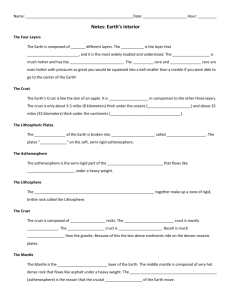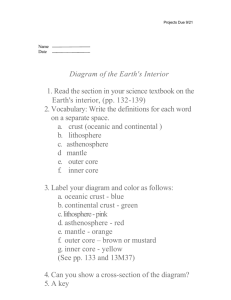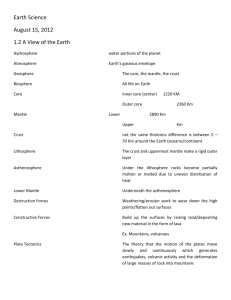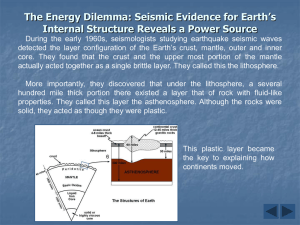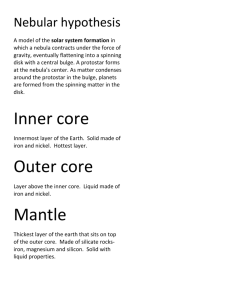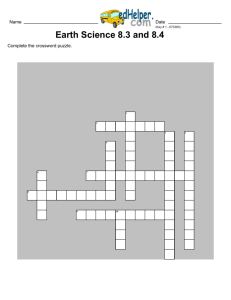Earth*s Layers
advertisement
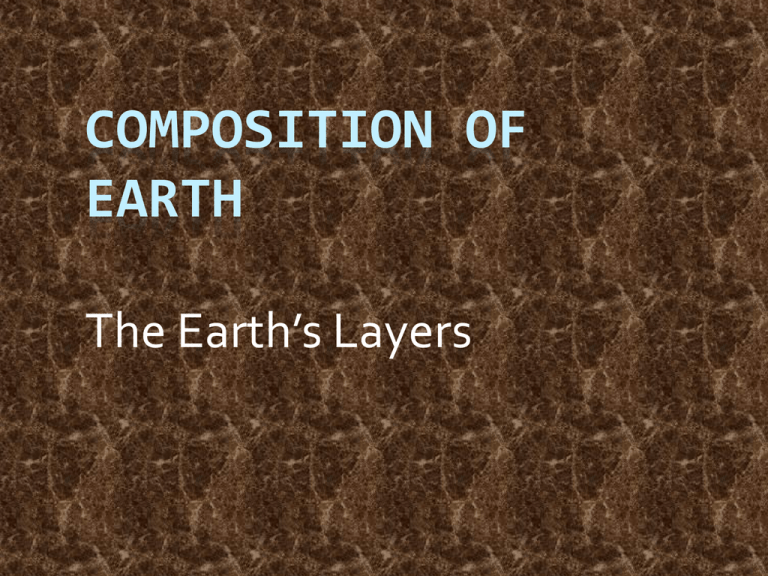
COMPOSITION OF EARTH The Earth’s Layers Composition of Earth Key Question: What is the earth made of? Initial Thoughts: The Four Layers The Earth is composed of four different layers. The crust is the layer that you live on, and it is the most widely studied and understood. The mantle is much hotter and has the ability to flow. The outer core and inner core are even hotter with pressures so great you would be squeezed into a ball smaller than a marble if you were able to go to the center of the Earth! The Crust The Earth's Crust is like the skin of an apple. It is very thin in comparison to the other three layers. The crust is only about 3-5 miles (8 kilometers) thick under the oceans (oceanic crust) and about 25 miles (32 kilometers) thick under the continents (continental crust). The Lithospheric Plates The crust of the Earth is broken into many pieces called plates. The plates "float" on the soft, semi-rigid asthenosphere. The Asthenosphere The asthenosphere is the semi-rigid part of the middle mantle that flows like hot asphalt under a heavy weight. The Lithosphere The crust and the upper layer of the mantle together make up a zone of rigid, brittle rock called the Lithosphere. The Crust The crust is composed of two rocks. The continental crust is mostly granite. The oceanic crust is basalt. Basalt is much denser than the granite. Because of this the less dense continents ride on the denser oceanic plates. The Mantle The Mantle is the largest layer of the Earth. The middle mantle is composed of very hot dense rock that flows like asphalt under a heavy weight. The movement of the middle mantle (asthenosphere) is the reason that the crustal plates of the Earth move. Convection Currents The middle mantle "flows" because of convection currents. Convection currents are caused by the very hot material at the deepest part of the mantle rising, then cooling and sinking again --repeating this cycle over and over. Convection Currents The next time you heat anything like soup or water in a pan you can watch the convection currents move in the liquid. When the convection currents flow in the asthenosphere they also move the crust. The crust gets a free ride with these currents, like the cork in this illustration. Safety Caution: Don’t get your face too close to the boiling water! The Outer Core The core of the Earth is like a ball of very hot metals. The outer core is so hot that the metals in it are all in the liquid state. The outer core is composed of the melted metals of nickel and iron. The Inner Core The inner core of the Earth has temperatures and pressures so great that the metals are squeezed together and are not able to move about like a liquid, but are forced to vibrate in place like a solid. Evidence: Earth Foldable Follow the “Make and Earth’s Layer’s Foldable” Guide 1. Color the layers using the KEY on the Guide 2. Fill out the 4 Layer BOXES. pages 177 in the Sciencesaurus and pg 177 in the Red Earth Science book 3. Cut and paste the layers AND labels Evidence: Earth Foldable Paste in worksheet to your journal. Answer the questions Analysis Questions 1. What layers make up the lithosphere? 2. What layers are not completely solid? 3. What layer can you find the convection currents? Summary What did you think about the earth’s composition before this lesson? What did you learn about the earth’s composition from this lesson? (Minimum of 4 sentences!!!) What are some further thoughts or questions you have about the earth’s composition? Reflection Create an analogy for the earth’s layers. Big Idea Rate My New Knowledge on the Learning Target 0 – I don’t understand 1 – I have some knowledge 2 – I understand the learning target well 3 – I understand the learning target well and I can teach someone else about it If you scored less than 2, explain what you can do to meet this standard
